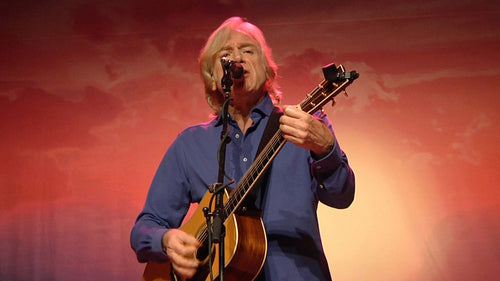
In the Mood with Justin Hayward
Written by: Stephanie Trotter
Music usually cuts one of two ways. Hearing a favorite song from childhood takes you right back to those heady days of youth or makes you feel older than dirt. If you’re predisposed to the latter, read on with caution.
The Moody Blues are celebrating the 45th anniversary of the release of their hallmark album “Days of Future Passed.” Yes, it’s been four decades and then some since scratchy vinyl discs of “Nights in White Satin” and “Tuesday Afternoon” spun around on the ol’ hi-fi.
The symphonic rock album sold millions of copies and solidified the Moodies as early pioneers in classical and progressive rock. Today their legacy rests soundly upon 70 million albums and SRO tours that crisscross the globe. Their new schedule includes a March 28 stop at the Peace Center, following their last appearance here in 2008.
TALK caught up with vocalist and lead guitarist Justin Hayward at his office between Monaco and the Italian border. Just what does he think of “Nights” all these years after writing it? His answer may surprise you.
TALK Greenville: Bonjour. Thanks for meeting with us. So you’re ready to hit the road for the big anniversary year?
Justin Hayward: Yes. We’re looking forward to it very much. It’s amazing to think we’re celebrating such a number of years, although I can’t say it seems like yesterday!
TG: Growing up in Wiltshire, England, dabbling with piano at 7 and ukulele at 9, did you ever think this kind of success would follow and be so long-lasting?
JH: Not specifically! (laughing) I certainly knew from age 8 or 9 my life was going to be about music. I was committed and dedicated to that. So I think I’d still be in a group playing in the pub up on the corner (if not this).
TG: What were your early influences?
JH: Radio Luxembourg was the only radio station that really played 45s, and every night you could listen to that. Britain was controlled by the BBC. It was very limited in what you could hear. So my early years were Radio Luxembourg and sharing music with other people, and going to their houses and listening to their records and girlfriends, you know what it’s like. You know, being turned on to music by your friends.
TG: What influence has American music had on you?
JH: I always look west. I think my great heroes were American. The first one actually was Johnnie Ray. He had a sort of cry in his voice and he really turned me on when I was a small child. Just listening to that, how he did that thing, that cry in his voice when he sang. And then Elvis, but I could never identify with Elvis because he was sort of out front of the band. And it was Buddy Holly that really made me focus on what I wanted to do because he was in a group, and he wrote and played guitar, and he sang. And so that was it really.
TG: What about closer to home?
JH: There was only one real British rock-and-roll record before The Beatles and that was “Move It,” which was Cliff (Richards). And you know fortunately The Beatles changed everything and opened doors for people like me. I just happened to be right in the middle of it when it was happening in London, so that was wonderful too.
TG: Did y’ll compete with The Beatles and Stones, or feed off each other creatively?
JH: We were definitely influenced by them, The Beatles particularly. I think what they were doing and the way they were doing things in the studio, influenced us a great deal. I think the album from “Hard Days Night” onward, when they really started to focus on how to record their own songs, that’s what interested us.
TG: Were you following a formula?
JH: We just had a couple of few lucky breaks in the early days. A wonderful accident. It wasn’t something that we planned. I can remember nothing in our career over the 45 years that’s been planned and thought through and gone to that plan at all. We’ve lurched and stumbled through this wonderful music.
TG: You’ve been with MB since ’66. How have y’all avoided the pitfalls of fame — excessive money, drugs, egos — and stayed together?
JH: (laughing) Well, we had the egos, you know, five guys in the band? Internally there’s always competition and a struggle between you, but it’s not always unpleasant. We were fortunate in that we focused completely on the music for the first seven to eight albums without focusing on ourselves as personalities. And so that gave us a different kind of style. That really helped us, particularly when we came to America. They didn’t want celebrity, they just wanted the music and our stuff was perfect for it.
TG: Recently, you heard the virgin cuts off MB’s first albums while working on a re-release. What did you think?
JH: My impression was, “How on earth did we do that?” I was stoned all the time. Not badly, just a gentle buzz going on and yet I delivered these songs. My songs would always be the first to be recorded. As I was going through the re-master, I was thinking, “How did I manage to do that? Where did all this stuff come from?” We were very, very fortunate.
TG: Many of your songs are autobiographical. When you sing them now, do you enjoy it, do they stand the test of time?
JH: Yes. There’s something about delivering songs like that to an audience and the feeling you get from the audience. A lot of people are hearing it for the first time live and that’s a wonderful thing to be able to share. It never fails to turn me on, really. I get involved with the emotion of that right from the very first bar.
TG: You’ve toured and traveled the world. How does Greenville fare on your itinerary?
JH: It lives always in memory. That’s the television series, with the policeman, and Barney and the kid, right?
TG: (laughing) Yes, that’s us. Andy Griffith.
JH: Andy Griffith, yes! That was huge when I was growing up in the ’60s. The first couple of times we went to America, we only saw the large industrial centers and I couldn’t wait to get out to South Carolina, North Carolina and Tennessee. It really turned me on the first time we did. Your voice resonates with something from my childhood. It’s superb, it really is.
TG: Well thank you, we’ll keep the Southern drawl going. Are crowds in the U.S. different?
JH: Yes. I can only say that when I’m talking to an American. Because if you say that to a British person, they’ll say, “Oh really?” But it is. I think Americans have always known how to enjoy live music and be part of it and include themselves in a concert and take part emotionally. The British are wonderful and I would never knock it, but it’s a much more reserved kind of thing. To get back into the U.S. where people are demonstrative in their feelings is wonderful, it’s why we keep coming back.
TG: Sounds like you’re one step shy of saying we rip our shirts off.
JH: Well, I have seen that. Right in front of us. In the ’60s and ’70s it was a little crazy, even in the ’80s too. It’s still OK by me. (smiling.)
TG: Where do you find inspiration today when writing?
JH: Thankfully, I’ve had a wonderful few years of writing and have recorded a lot. I’m very pleased with the things I’ve done. Whether it will come out as a Moodies record or some other thing, I don’t know yet. I’ve never really tried to analyze inspiration for songs too much. Inspiration must find me working. I think Picasso said that. And that’s absolutely right. So to play the guitar every day and have my keyboards around me, hopefully something will come out of that.
TG: And we can’t wait to hear it all in Greenville. See you then. For more on the group and their show at the Peace Center, go to MoodyBluesToday.com.
